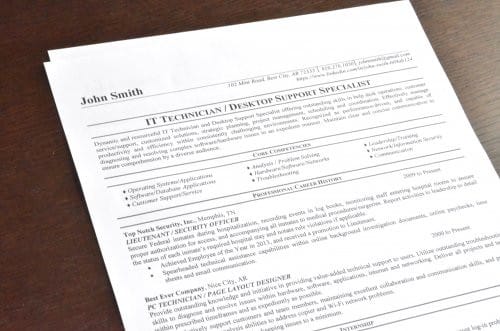- Defined Skills
- Personality Traits
- Adventurousness
- Artistic Ability
- Attentiveness
- Cultural Sensitivity
- Compassion Skills
- Teaching Skills
- Spatial-Orientation Skills
- Self-Discipline Skills
- Resourcefulness Skills
- Reliability Skills
- Perseverance Skills
- Perceptiveness Skills
- Patience Skills
- Curiosity Skills
- Dedication Skills
- Dependability Skills
- Determination Skills
- Discipline Skills
- Empathy Skills
- Flexibility Skills
- Observation Skills
- What Are Character Traits?
- Productivity Skills
- Common Skills
Find a Job You Really Want In
Crafting a successful resume when you have little to no work experience may seem complicated, but that doesn’t change how vital a quality resume is. In many ways, your resume is like your first interview, as it will provide a crucial introduction and first impression to a hiring manager.
With that in mind, it’s easy to see why nailing your entry-level resume is your first and potentially last opportunity to outline what makes you an ideal candidate.
So how do you make an entry-level resume impressive and successful?
In general, you’ll want to showcase your accomplishments, skills, and qualifications without sacrificing readability. Unlike other resumes, what you outline in an entry-level resume may be less specialized, but it’s still essential that you include whatever you feel makes you a more attractive candidate.
Fortunately, this article will discuss what makes a successful entry-level resume and provide examples and other valuable tips.
The Basics: What You Should Include in an Entry-Level Resume
When you first get started, you’ll probably feel worried that you simply don’t have enough content to pad your resume with. Fortunately, you might have more helpful experience than you think.
Here are some crucial elements to include in your resume:
-
Contact information. What good is any job application if the employer doesn’t know how to reply to you?
When writing your resume, always be sure to include your full legal name, email, phone number, and other relevant contact information at the top of the page. This will ensure that the employer has several methods of contacting you.
-
Highest level of education. Often, one of your best ways of landing a job you don’t have experience in is through your education.
Regardless of whether you only graduated high school or have a Bachelor’s Degree, you should include any relevant classes you’ve taken, your major, your GPA (if 3.5+), and any other educational achievements you can think of.
-
Relevant work experience. Even if you’ve never had a full-time job, you likely have some kind of work experience.
For example, if you’ve ever babysat or watched someone’s dogs, worked on a farm, had a summer job, or done any other kind of part-time work, you can include those experiences in your resume. Relevant or not, any experience is better than none!
-
Volunteer work and other activities. Similar to work experience, it can be valuable to include any volunteer work you’ve done. For instance, if you’ve volunteered at an animal shelter, school, homeless shelter, or food bank, employers will be interested in your ability to serve your community.
-
Personal projects. If you’ve ever had your own small business or made something relevant for the job you’re applying to, you can include that in your resume.
For example, if you spent your teenage years creating simple woodwork projects and selling them online, that experience could be helpful for a variety of retail, art, or construction jobs.
-
Relevant skills and qualifications. Overall, the more relevant skills and qualifications you can include in your resume, the better. From personality traits to languages and computer programs to medical certifications. Think of anything helpful you can add.
-
Keywords. Hiring managers typically don’t have a lot of time to review your resume, so including keywords can be an easy way to catch their eye. When you read a job description, be sure to analyze the position requirements so you can use similar language in your resume.
For example, if there’s a position that requires you to have experience using Microsoft Word, you should mention that you have experience using Microsoft Word in your resume.
What Hiring Managers Are Looking for in an Entry-Level Resume
Now that you know what to include in your resume, it’s also important to cater to your key achievements and experiences to fit what potential employers will be looking for.
In general, basing the information in your resume around what a hiring manager wants to hear will bring you one step closer to landing the position. Just think of it as looking at things from their perspective!
With that in mind, here are some of the essential things that will catch a hiring manager’s eye:
-
Readability. Hiring managers are busy people, and therefore, they don’t have endless time to review your resume. Typically, the average employer only spends less than 10 seconds reviewing your resume, so making all of your key points easy to read can be a crucial part of making anything stick.
When in doubt, use keywords, stick to streamlined formatting, and keep your word count low.
-
Positivity. While there are several personality traits employers look out for, positivity is one of the most important ones. Your ability to make light of any situation, stay motivated, and bring good vibes to the workplace cannot be understated.
Try to radiate positivity when you craft your sentences, so the employer will sense that you’d have that same energy in the workplace.
-
Leadership and teamwork. While leadership and teamwork may seem like opposing forces, having both is a crucial part of any workplace. When possible, use examples to outline why you’re an effective leader and a thoughtful team player.
Generally speaking, these two skills come down to confidence and adept communication.
-
Relevancy. If you’re applying at entry-level, employers want to know why exactly you applied in the first place. Show why you’re interested in the position and include as many relevant skills, experiences, and qualifications as possible.
How to Structure an Entry-Level Resume
When you begin writing your resume, the first thing you should think about is your formatting. As mentioned previously, be sure to list your contact information at the top of the page and then summarize yourself.
Typically, resumes are split up into sections to make them more digestible. Common sections include:
-
Resume Summary/Objective
-
Relevant Experience
-
Education
-
Skills
-
Accomplishments
-
Certifications or Projects
While you can add more sections if you choose, you should be mindful of your resume’s length and readability.
Another effective way to maintain readability is to organize the information in your sections as bullet notes, so any employer can simply take a glance and receive all the information they need. Any section written in sentences should be no more than a short paragraph.
As with any professional document, your resume should also pull from a group of acceptable font types, which are sized and spaced appropriately.
If you’re not sure what font types are acceptable, here is a list of ten potential fonts you can use:
-
Arial
-
Calibri
-
Corbel
-
Garamond
-
Gill Sans
-
Helvetica
-
Open Sans
-
Roboto
-
Times New Roman
Remember to pay attention to the simplicity of the style. If a font seems simple and easy to read, it is probably acceptable. Simple fonts are preferred in part because heavily stylized fonts might be difficult for someone to read. Ideally, the reader should be able to skim the most important information from your resume quickly and efficiently.
After selecting a font, you should choose your font size based on the same logic as the font type. Therefore, select the smallest size that is still easily readable—typically between 10 and 12. The font type you chose may alter the size slightly, but be sure to avoid oversizing your font, as your resume may appear unprofessional.
When in doubt, don’t go overboard. Keep everything simple, and to the point, so you can retain the employer’s attention.
Entry-Level Resume Examples
Put together, all of these tips culminate to create easy-to-read, relevant, and practical resumes. Here are a few examples:
Application for a gardening job (e.g., Home Depot or Walmart Gardening centers)
Duncan Hinterland
San Francisco, CA 94016
Cell: (555) 555-5555
[email protected]Summary
Passionate Gardener with over four years of experience growing and taking care of various plants, including flowers, vegetables, and trees. Has worked with neighbors and friends to build thoughtful, community-oriented, and flourishing gardens. Excellent communication, time management, and multitasking skills, with a willingness to learn.
Accomplishments
Maintained a family garden for over four years.
Created a watering schedule to prevent dead or wilting plants.
Took care of 3 different neighbor’s gardens when they were on vacation.
Skills
Passionate
Communication
Sprinkler System Knowledge
Weeding gardens
Transplanting and potting plants
Tree trimming and cutting branches
Watering lawns and trees
Growing plants indoors
Experience Highlights
Garden Sitting, Part-Time Work, 03/2017 to Current
San Francisco, CA 94016
Watched 12 gardens for up to a month.
Followed detailed instructions left by neighbors.
Provided daily status reports.
Backyard Growers, Internship, 05/2018 to 09/2018
San Francisco, CA 94016
Propagated trees for faster and more efficient growing.
Grew several different plant seeds from seed, with successful results.
Trimmed greenery, shrubs, and hedges to maintain a uniform appearance.
Horticulture, Education, 09/2016 to 05/2020
San Francisco High School — San Francisco, CA 94016
Applied eco-friendly weeding and pest control methods.
Helped the community by planting 8 trees around the neighborhood.
Education
High School Diploma: Horticulture and General Studies
SF High School – San Francisco, CA 94016
Final Project:
Recovered ten different species with a plethora of purposeful issues, from root rot to being overrun with pests—all ten different plant species recovered through proper treatment and care.
Application for a specific field at entry-level
Zack Kirkland
Pittsfield, MA 01201
Cell: (555) 555-5555
[email protected]Summary
Hardworking anthropology graduate with a passion for early American history and local archaeology projects. Has participated in two different archaeology field schools sponsored by UMASS Boston. Excellent knowledge of early American artifacts and Massachusetts fieldwork protocol, accompanied by the ability to work in teams effectively.
Accomplishments
Uncovered and cleaned an intact border ware vessel.
Participated in the same summer archaeology project for three years in a row.
Graduated from UMASS with a degree in Anthropology.
Skills
Zotero
Communication
Microsoft Word and Office
Archaeology fieldwork and lab work
Creating Units
PowerPoint
Identifying early American artifacts
American History
Experience Highlights
Plymouth Field Archaeology, Internship, 05/2018 to 06/2021
Fiske Center UMB — Plymouth, MA 02360
Created and dug units and STPs properly.
Conducted fieldwork that respected and incorporated local and indigenous populations.
Cleaned artifacts and performed other lab tasks in a public museum to educate others.
Worthington Field Archaeology, Volunteer work, 07/2018 to 09/2018
Worthington, MA 01098
Worked with the local historical society to uncover local artifacts.
Efficient teamwork and communication with other members of the community.
Discovered glassware that was over 250 years old.
Education
Bachelor of Arts: Anthropology, Graduated
University of Massachusetts – Amherst, MA 01122
Final Project:
Wrote a 70-page thesis about indigenous and colonial archaeology in the 13 colonies.
Graduated with a 3.7 GPA.
High School Diploma: General Studies
Pittsfield High School – Pittsfield, MA 01201
Entry-Level Resume Tips
Now that you know how to write an effective entry-level resume, here are some additional tips to keep in mind when you draft your first copy:
-
Keep it short and to the point. Hiring managers have lives too, so it’s essential that you limit the length of your resume and only include the essential information. Ideally, your resume should only be around a page long. Doing this will help maximize readability and retain the potential employer’s interest.
-
Thoroughly proofread. It’s critical that the spelling and grammar of your resume are on point. Given that, you should spend a considerable amount of time proofreading, so you have a better chance of catching these errors.
-
Avoid first-person pronouns. First-person pronouns have a way of killing professionalism. In general, avoiding them will improve the quality of your resume. For example, instead of saying, “I increased sales by 22%”, simply write: “Increased sales by 22%”.
-
Professionally label the resume file. If you’re sending your resume to a potential employer via email, you must label the document appropriately. One of the best ways to label your resume is by titling the document with your first and last name, followed by the word “resume.”
-
Quantify when possible. The more specific you can make your achievements on your resume, the better. Instead of writing that you “have a lot of experience,” it’s better to say that you “have five years of experience.” Accurate numbers, dates, and percentages will improve the quality of your resume.
- Defined Skills
- Personality Traits
- Adventurousness
- Artistic Ability
- Attentiveness
- Cultural Sensitivity
- Compassion Skills
- Teaching Skills
- Spatial-Orientation Skills
- Self-Discipline Skills
- Resourcefulness Skills
- Reliability Skills
- Perseverance Skills
- Perceptiveness Skills
- Patience Skills
- Curiosity Skills
- Dedication Skills
- Dependability Skills
- Determination Skills
- Discipline Skills
- Empathy Skills
- Flexibility Skills
- Observation Skills
- What Are Character Traits?
- Productivity Skills
- Common Skills





